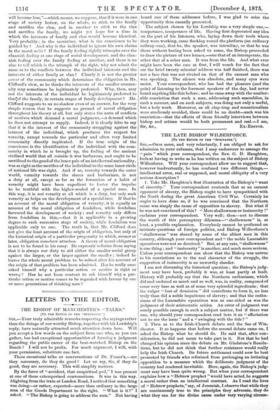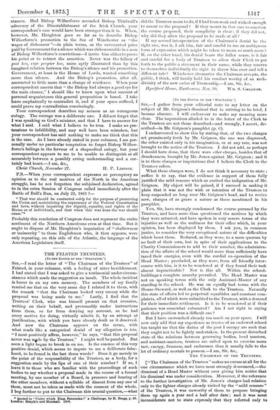THE LATE BISHOP WILBERFORCE.
[TO THE EDITOR OF THE "SPECTATOR."]
Sin,—Once more, and very reluctantly, I am obliged to ask for admission to your columns, that I may endeavour to assuage the " pain " which your correspondent, the Rev. G. D. Houghton, feels at having to write as he has written on the subject of Bishop Wilberforce. Will your correspondent allow me to suggest that, however inadvertently, he has confused two different things,— intellectual error, real or supposed, and moral obliquity of a very serious description ?
1. Take Mr. Haughton's first illustration of the Bishop's " want of sincerity." Your correspondent contends that as an earnest opponent of slavery, the Bishop ought to have sympathised with the North during the great American Civil War. Certainly he ought to have done so, if he was convinced that the Northern cause was simply the cause of opposition to slavery. But what if he was not convinced of this? " Mere shallowness or insincerity !" exclaims your correspondent. Very well ; then—not to discuss the worth of this peremptory dilemma—" shallowness" is, at least, a possible explanation. Everybody cannot be profound on intricate questions of foreign politics, and Bishop Wilberforce's " shallowness" was shared by some of the ablest men in this country, although your correspondent and " the noble Lancashire operatives were not so deceived." But, at any rate, "shallowness" is one thing ; and " insincerity" is another, and much more serious. Unless your correspondent can show that the Bishop was untrue to his convictions as to the real character of the struggle, the suggestion of insincerity is an unworthy slander.
I am not discussing the historical question ; the Bishop's judg- ment may have been, probably it was, at least partly at fault. History will probably say that the Northern enthusiasm, which did and endured so much and so well, was, in reality, composed of some very base as well as of some very splendid ingredients ; that the vulgar " lust of dominion " did contribute to form it, no less truly than did a noble impatience of slavery; and that the enthu- siasm of the Lancashire operatives was as one-sided as was the judgment of their aristocratic critics. An error of judgment was surely possible enough in such a subject matter, but if there was one, why should your correspondent read into it an " affectation not to see the issue " and a " swinging with the tide? "
2. Then as to the Irish-Church debate and the See of Win- chester. It so happens that before the second debate came on, I asked the Bishop what he should do. He said that, after con- sideration, he did not mean to take part in it. Not that he had changed his opinion since the debate on Mr. Gladstone's Resolu- tions, but he did not think that further resistance would really help the Irish Church. Its future settlement could now be best promoted by friends who refrained from prolonging an irritating -opposition to a measure which the deliberate judgment of the country had rendered inevitable. Here, again, the Bishop's judg- ment may have been quite wrong. But when your correspondent explains how a "Hebrew prophet " would have acted, he suggests a moral rather than an intellectual contrast. As I read the lives of " Hebrew prophets," say, of Jeremiah, I observe that while they are continuously true to the principles they advocate, they do what they can for the divine cause under very varying circum-
stances. Had Bishop Wilberforce seconded Bishop Thirlwall's advocacy of the Disestablishment of the Irish Church, your correspondent's case would have been stronger than it is. When, however, Mr. Haughton goes so far as to describe Bishop Wilberforce's promotion to the See of Winchester as "the wages of dishonour "—in plain terms, as the covenanted price paid by Government for a silence which was dishonourable in a man of Bishop Wilberforce's convictions—I invite him eithcrto prove his point or to retract the assertion. Never was the fallacy of post hoc, ergo propter hoc, more aptly illustrated than by this imagined relation between the Bishop's silence and his promotion. Government, at least in the House of Lords, wanted something more than silence. And the Bishop's promotion, after all, amounted to little more than a change of residence. When your correspondent asserts that " the Bishop had always a good eye for the main chance," I should like to know upon what amount of personal acquaintance this general proposition is based. I take leave emphatically to contradict it, and if your space sufficed, I -could prove my contradiction convincingly.
Your correspondent describes my sermon as an outrageous eulogy. The outrage was a deliberate one. I did not forget that I was speaking as God's minister, and that I have to answer for what I said. I said what I believe to be true. I make no pre- tensions to infallibility, and may well have been mistaken, but your correspondent has said nothing to make me think that this is the case. As I have already stated in your columns, I am per- sonally under no particular temptation to forget Bishop Wilber- force's failings in the fervour of a rhapsodical eulogy, but your 'correspondent appears to me to be unable to distinguish at all accurately between a possibly erring understanding and a cer- tainly bad heart.—I am, &c.,
P.S.—When your correspondent expresses so peremptory an opinion as to the real motives of the North in the American -struggle, has he not forgotten the subjoined declaration, agreed to in the extra Session of Congress called immediately after the Battle of Bull's Run, on July 22, 1861 ?-
"That war should be conducted solely for the purpose of preserving the Union and maintaining the supremacy of the Federal Constitution and laws, without impairing the dignity, equality, and rights of the States or of individuals, and that when this was done the war should -cease.""
Probably this resolution of Congress does not represent the entire sentiment of the Northern Americans even at that time. But it -ought to dispose of Mr. Haughton's imputation of " shallowness -or insincerity " to those Englishmen who, it thus appears, were only repeating, on this side of the Atlantic, the language of the American Legislature itself.







































 Previous page
Previous page